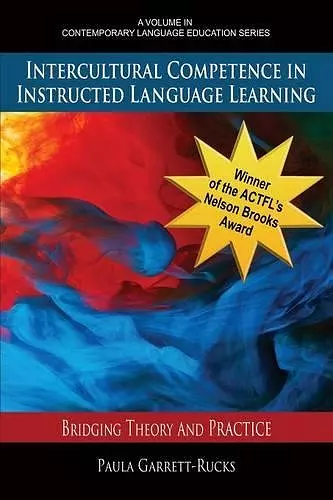Intercultural Competence in Instructed Language Learning
Bridging Theory and Practice
Paula Garrett-Rucks author Terry Osborn editor
Format:Paperback
Publisher:Information Age Publishing
Published:8th Mar '16
Currently unavailable, and unfortunately no date known when it will be back

There is pressure on world language educators to prepare learners with 21st century skills to meet the challenges of an increasingly interconnected globalized world. The need for change was summarized in the 2007 report of the MLA Ad Hoc Committee on Foreign Languages that suggested the implementation of curricular reform by developing students’ “translingual and transcultural competence” (p. 3) which allows someone “to operate between languages” (p.237). However, the integration of such a meaningful cultural component in instructed language learning is a complex topic. This book recognizes the difficulty world language educators face to achieve the goals of the MLA report, particularly at beginning levels of instruction in target language use classrooms. Accordingly, this book informs instructed language learning and teaching by bridging developmental theories from the fields of intercultural competence with second language pedagogies—particularly communicative language teaching (CLT) and literacy-based approaches—providing examples of practical applications inside the classroom and beyond. It is intended to support the many FL educators who have consistently reported that they are struggling to incorporate meaningful cultural instruction into their practice (Fox & Diaz-Greenberg 2006; Phillips & Abbott, 2011; Sercu, 2005).
This book provides a framework to foster learners’ deep cultural reflection at beginning levels of instruction while preserving target language use policies, bridging CLT pedagogies to intercultural communicative competence (ICC) literacy-based approaches. It starts by synthesizing prominent definitions of culture and culture learning models and then summarizes disparate sources of research findings on culture learning projects (which primarily take place at advanced levels of language learning) to the Standards-based classroom at all levels of instruction, K-16. Although research on fostering learners’ intercultural competence at beginning levels of language instruction is in its infancy, it is of utmost concern given that the vast majority of U.S. language learners rarely continue to advanced levels of instruction (Zimmer-Lowe, 2008). In addition, this book challenges FL educators to advocate for their FL programs and to give greater visibility and credibility to the profession in institutional internationalization efforts.
The theoretical components of this book deconstruct the connections between language, thought and culture and problematize developmental models in the IC field that neglect to consider the important role of language. This book provides K-16 FL educators with the discourse needed to 1) explain...
ISBN: 9781681234175
Dimensions: unknown
Weight: unknown
178 pages